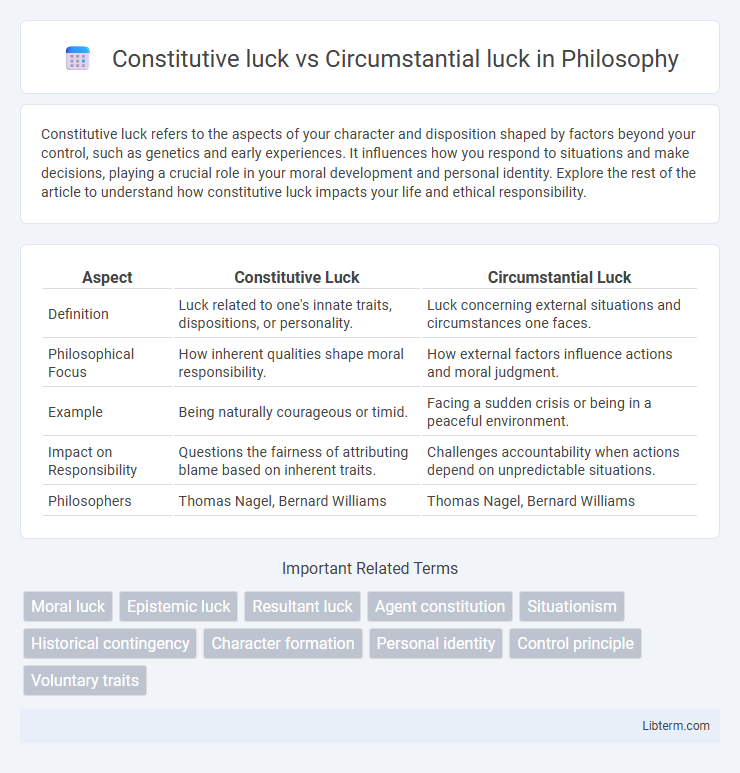Constitutive luck refers to the aspects of your character and disposition shaped by factors beyond your control, such as genetics and early experiences. It influences how you respond to situations and make decisions, playing a crucial role in your moral development and personal identity. Explore the rest of the article to understand how constitutive luck impacts your life and ethical responsibility.
Table of Comparison
| Aspect | Constitutive Luck | Circumstantial Luck |
|---|---|---|
| Definition | Luck related to one's innate traits, dispositions, or personality. | Luck concerning external situations and circumstances one faces. |
| Philosophical Focus | How inherent qualities shape moral responsibility. | How external factors influence actions and moral judgment. |
| Example | Being naturally courageous or timid. | Facing a sudden crisis or being in a peaceful environment. |
| Impact on Responsibility | Questions the fairness of attributing blame based on inherent traits. | Challenges accountability when actions depend on unpredictable situations. |
| Philosophers | Thomas Nagel, Bernard Williams | Thomas Nagel, Bernard Williams |
Understanding Constitutive Luck: Definition and Examples
Constitutive luck refers to the aspects of an individual's character, temperament, or innate abilities that are determined by factors beyond their control, such as genetics or early environmental influences. For example, being naturally talented in mathematics or possessing a calm disposition during stressful situations are instances of constitutive luck. This type of luck shapes how a person responds to life's challenges and opportunities, influencing their moral and practical decision-making processes.
Exploring Circumstantial Luck: What Sets It Apart
Circumstantial luck refers to the fortunate or unfortunate situations individuals encounter due to external events beyond their control, significantly influencing life outcomes. Unlike constitutive luck, which relates to inherent traits and predispositions, circumstantial luck centers on the timing and environment of specific situations, such as being present during historic opportunities or crises. This form of luck shapes decisions and chances by placing individuals in particular contexts that can either hinder or enhance success.
Philosophical Origins of Luck in Ethics
Constitutive luck, a concept explored by philosopher Thomas Nagel, refers to the inherent traits and dispositions influencing moral agency beyond one's control, such as temperament or cognitive capacities. Circumstantial luck involves the specific situations or external conditions that affect an individual's ethical decisions, highlighted in Bernard Williams' analysis of moral luck. These distinctions trace the philosophical origins of luck in ethics by challenging the presumption that moral responsibility depends solely on factors within a person's control.
Constitutive Luck: Impact on Character and Morality
Constitutive luck refers to the innate traits, dispositions, and psychological makeup that shape an individual's character and moral outlook, independent of their choices or actions. This form of luck influences how people perceive ethical dilemmas and respond to moral challenges, often determining their capacity for virtues such as empathy, courage, or honesty. Understanding constitutive luck highlights the extent to which moral responsibility is intertwined with factors beyond personal control, emphasizing the complexity of ethical evaluation.
Circumstantial Luck: Role in Life Events and Opportunities
Circumstantial luck significantly influences life events and opportunities by determining the external conditions individuals encounter, such as being born into a particular social class or historical period. These situational factors create advantages or obstacles that shape personal success, access to resources, and pivotal life choices. Understanding circumstantial luck underscores the importance of environment in shaping outcomes beyond individual control.
Comparing Constitutive and Circumstantial Luck
Constitutive luck refers to the inherent traits and dispositions that shape an individual's character and decision-making abilities, while circumstantial luck involves the external conditions and situations influencing one's actions and outcomes. Comparing constitutive and circumstantial luck highlights how internal factors, such as personality, interact with external events, such as opportunities or threats, in shaping moral responsibility and success. Understanding this distinction clarifies the nuanced impact of luck on ethical evaluations and personal development.
The Ethical Implications of Different Types of Luck
Constitutive luck, relating to inherent traits and dispositions, raises ethical questions about moral responsibility and fairness in judgment, as individuals cannot choose their innate characteristics. Circumstantial luck, involving external situations that influence one's actions, complicates accountability by highlighting how factors beyond control affect decision-making and outcomes. Understanding these distinctions is crucial for developing just ethical frameworks that fairly assess blame and praise.
Luck and Personal Responsibility: A Critical Analysis
Constitutive luck, involving traits and dispositions shaping individual character, profoundly influences personal responsibility by highlighting the limits of moral accountability for aspects beyond one's control. Circumstantial luck pertains to external situations affecting decision-making opportunities, challenging deterministic views on moral agency and emphasizing the complexity of attributing responsibility. Understanding these forms of luck underscores the need for nuanced ethical frameworks recognizing both the impact of uncontrollable factors and the significance of personal choice in assessing accountability.
Social Justice Perspectives on Constitutive vs Circumstantial Luck
Constitutive luck refers to the inherent traits and dispositions individuals are born with, while circumstantial luck involves the external situations and events that influence life outcomes. Social justice perspectives emphasize how constitutive luck affects access to opportunities and resources based on innate characteristics such as race, gender, or disability, often reinforcing systemic inequalities. Addressing circumstantial luck requires structural reforms to mitigate the impact of unequal environments, aiming to create fairer social conditions regardless of individual circumstances.
Addressing Luck in Moral Judgments and Policy-Making
Constitutive luck, which concerns inherent traits and dispositions shaped by factors beyond an individual's control, complicates moral judgments by challenging the fairness of holding people accountable for actions influenced by their character. Circumstantial luck involves the external situations and contexts individuals face, affecting decisions and behaviors in ways that policy-making must consider to ensure equitable outcomes. Addressing both types of luck in moral evaluations and policy development promotes a more nuanced understanding of responsibility, fostering fairness through tailored interventions and judgments that account for uncontrollable influences.
Constitutive luck Infographic

 libterm.com
libterm.com